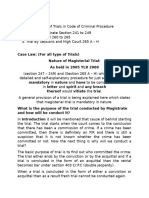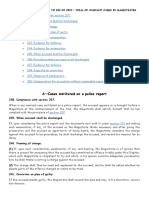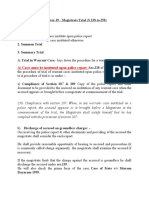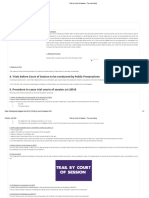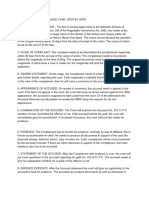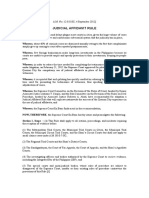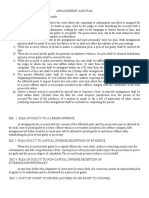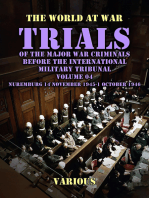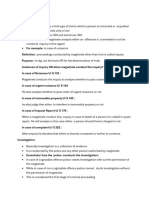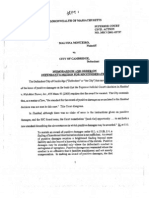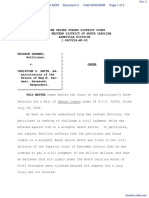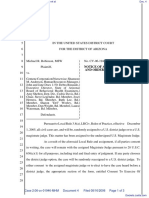0 ratings0% found this document useful (0 votes)
0 viewsSessions Trial (265A - 265N)
Sessions Trial (265A - 265N)
Uploaded by
shahzadjaved640Trial by session Court
Copyright:
© All Rights Reserved
Available Formats
Download as PDF, TXT or read online from Scribd
Sessions Trial (265A - 265N)
Sessions Trial (265A - 265N)
Uploaded by
shahzadjaved6400 ratings0% found this document useful (0 votes)
0 views12 pagesTrial by session Court
Copyright
© © All Rights Reserved
Available Formats
PDF, TXT or read online from Scribd
Share this document
Did you find this document useful?
Is this content inappropriate?
Trial by session Court
Copyright:
© All Rights Reserved
Available Formats
Download as PDF, TXT or read online from Scribd
Download as pdf or txt
0 ratings0% found this document useful (0 votes)
0 views12 pagesSessions Trial (265A - 265N)
Sessions Trial (265A - 265N)
Uploaded by
shahzadjaved640Trial by session Court
Copyright:
© All Rights Reserved
Available Formats
Download as PDF, TXT or read online from Scribd
Download as pdf or txt
You are on page 1of 12
SESSIONS TRIAL
Relevant Provisions:
Sections 265A to 265N of Cr.P.C.
265A. TRIAL BEFORE COURTS OF SESSION TO
BE CONDUCTED BY PUBLIC PROSECUTOR:
Every trial initiated upon police report before
the Court of Sessions, the prosecution shall be
conducted by the Public Prosecutor.
265B. PROCEDURE IN CASES TRIABLE BY
HIGH COURT AND COURTS OF SESSION:
The following procedure shall be observed by
the High Court and the Courts of Session in the
trial of cases by the said Courts.
265C. SUPPLY OF STATEMENTS AND
DOCUMENTS TO THE ACCUSED:
1. In all cases instituted upon police report,
copies of the following documents shall be
supplied free of cost to the accused not
later than seven days before the
commencement of the trial, namely:
a. The first information report ;
b. The police report;
c. The statement of all witnesses u/s 161
and 164;
d. The inspection note recorded by the
investigation officer on his first visit to the
place of occurrence.
Provided that, if any part of the statement
recorded u/s 161 or 164 is such that its
disclosure to the accused would be inexpedient
in public interest, such part of the statement
shall be excluded from the copy of statement
furnished to the accused.
2. In all cases instituted upon complaint in
writing:
a. The complainant shall:
i. State in the petition of complaint the
substance of accusation , the names of
the witnesses and the gist of evidence
which he is likely adduce at the trial;
ii. Within three days of the order of the Court
under section 204 for issue of process to the
accused, file in the Court for supply of
copies of the complaint to the accused and
any other documents which he has filed with
the complaint;
b. Copies of the complaint and any other
document which the complainant had filed
and the statements under section 200 or
202 shall be supplied free of cost to the
accused not later than seven days before
the commencement of the trial.
265D. WHEN CHARGE TO BE FRAMED:
If after observing the police report or as the
case may be the complaint and all other
documents and statements filed by the
prosecution, the Court is of opinion that there is
ground for proceeding with the trial of the
accused it shall frame in writing the charge
against the accused.
265E. PLEA:
1. The charge shall be read and explained
to the accused and he shall be asked that
whether he pleads guilty or he has any
defence to make.
2. If the accused pleads guilty, the Court
shall record the plea and may in its
discretion convict him.
265F. EVIDENCE FOR PROSECUTION:
1. If the accused does not plead guilty or
the Court does not convict him on his plea,
the Court shall proceed to hear the
complainant and shall take all such
evidence which may be produced in support
of prosecution:
Provided that the Court shall not be bound to
hear any person as complainant in any case in
which the complaint has been made by the
Court.
2. The Court may ascertain from the Public
Prosecutor or as the case may be from the
complainant, the names of any person
likely to be acquainted with the facts of the
case and to be able to give evidence for
prosecution and shall summon such
person to give evidence before it.
3. The Court may refuse to summon any
such witness if the Court is of opinion that
such witness is being called for the purpose
of delay, vexation, or defeating the ends of
justice.
4. When the examination of the witnesses
for the prosecution and the examination of
the accused are concluded, the accused
shall be asked that whether he means to
adduce evidence.
5. If the accused put in any written
statement, the Court shall file it with the
record.
6. If the accused or any of the several
accused says that he means to adduce
evidence the Court shall call on the
accused to produce his evidence.
7. If the accused or any of the several
accused after entering the defence, applies
to the Court for issue any process for
compelling the attendance of any witness
for examination or production of any
document or other thing, the Court shall
issue such process unless it considers that
the application is made for purpose of
delay, vexation or defeating ends of
justice.
265G. SUMMING UP BY PROSECUTOR AND
DEFENCE:
1. In cases where the accused or any one of
several accused does not adduce evidence
in his defence, the Court shall on close of
prosecution case and examination of the
accused, call upon the prosecutor to sum
up the case and the accused shall make a
reply.
2. In cases where the accused or any of the
several accused, adduces evidence in his
behalf, the Court shall on the close of
prosecution case and examination of
accused, call upon the accused to sum up
his case whereafter the prosecutor shall
make a reply.
265H. ACQUITTAL OR CONVICTION:
1. If the Court finds the accused not guilty,
it shall record the order of acquittal.
2. If the Court finds the accused guilty the
Court shall subject to the provisions of
section 265I, convict him according to law .
265I. PROCEDURE IN CASE OF PREVIOUS
CONVICTION:
1. If a person is charged u/s 221, sub –
section (7) of Cr.P.C for previous conviction,
the Court shall record a plea of accused
relating to such part of charge and after
finding the accused guilty of the offence
charged shall pass a sentence according to
law.
2. If the accused admits that he had been
previously convicted as alleged in charge,
the Court may pass a sentence according to
law and if the accused does not admit that
he has been previously convicted as
alleged in charge, the Court may take
evidence in respect of the alleged previous
conviction and may record finding and then
pass sentence according to law.
265J. STATEMENT U/S 164 ADMISSIBLE:
The statement recorded U/S 164 Cr.P.C shall be
treated as an evidence, subject to the provisions
of Evidence Act, 1872.
265K. POWER OF COURT TO ACQUIT
ACCUSED AT ANY STAGE:
Court have the power acquit the accused at any
stage, if after hearing the prosecutor and the
accused, it considers that there is no probability
of the accused being convicted of any offence.
265L. POWER OF ADVOCATE GENERAL TO
STAY PROSECUTION:
At any stage of any trial before a High Court,
before the sentence is passed, the Advocate
General, may if he thinks fit, inform the Court on
behalf of the Government that he will not
prosecute the accused upon the charge and
therefore all proceedings against the accused
shall be stayed and he shall be discharged for
the time being but such discharge shall not
amount to acquittal unless the presiding judge
directs.
265M. TIME OF HOLDING SITTING:
Every High Court shall hold the sittings on such
days at such convenient intervals as the Chief
Justice of such Court from time to time
appoints, for the exercise of original criminal
jurisdiction.
265N. PLACE OF HOLDING SITTINGS:
1. The High Court shall hold its sittings at
the place at which it held or at such other
place ad the Provincial Government may
direct.
2. But the High Court may from time to
time with the consent of the Provincial
Government, hold sitting at such other
places within the local limits of the appellate
jurisdiction.
3. Such officer as the Chief Justice directs
shall give prior notice in the official Gazette
of all sittings intended to e held for original
criminal jurisdiction of the High Court.
You might also like
- The Trial Process in KenyaDocument8 pagesThe Trial Process in KenyaMuthoni60% (5)
- Procedure For Trial Before Sessions CourtDocument3 pagesProcedure For Trial Before Sessions CourtFaisal Rauf83% (6)
- Document PDFDocument3 pagesDocument PDFAyzal NishatNo ratings yet
- Trial Before A Court of SessionDocument4 pagesTrial Before A Court of SessionadvaitNo ratings yet
- Magisterial Trial 241 To 249Document10 pagesMagisterial Trial 241 To 249Rabia SaeedNo ratings yet
- Trials Before Court of Session To Be Conducted by Public ProsecutionsDocument2 pagesTrials Before Court of Session To Be Conducted by Public ProsecutionsAmitav TalukdarNo ratings yet
- Different Stages of Criminal TrialDocument3 pagesDifferent Stages of Criminal TrialSyed Arsalan Raza Zaidi100% (1)
- Warrant, Summon and Summary TrialDocument9 pagesWarrant, Summon and Summary TrialArisha AzharNo ratings yet
- Chapter-19 - Magistrate Trial (S 238 To 250) : A) Cases Must Be Instituted Upon Police ReportDocument7 pagesChapter-19 - Magistrate Trial (S 238 To 250) : A) Cases Must Be Instituted Upon Police Reporthimani baidNo ratings yet
- Trail by Court of Session - The Law StudyDocument3 pagesTrail by Court of Session - The Law StudyNaseeb UllahNo ratings yet
- Unit 9 TrialDocument41 pagesUnit 9 TrialnupurkhannaNo ratings yet
- CRPC PDFDocument4 pagesCRPC PDFImran PathanNo ratings yet
- Trial of Summons Case by MagistratesDocument12 pagesTrial of Summons Case by MagistratesTanvi RamdasNo ratings yet
- Rem NotesDocument4 pagesRem NoteskhimpotchingNo ratings yet
- Judicial Affidavit RuleDocument7 pagesJudicial Affidavit Rulemina villamorNo ratings yet
- Law of Evidence I Standard of Proof Part 2: Prima Facie A.IntroductionDocument10 pagesLaw of Evidence I Standard of Proof Part 2: Prima Facie A.IntroductionKelvine DemetriusNo ratings yet
- All About Commencement of Proceedings Under Code of Criminal Procedure1973 by Sakshi RewariaDocument15 pagesAll About Commencement of Proceedings Under Code of Criminal Procedure1973 by Sakshi RewariaArya VermaNo ratings yet
- Summons Trial and Summary TrialDocument5 pagesSummons Trial and Summary TrialKhatib MalikNo ratings yet
- Stages of Cheque Bounce Case - Step by StepDocument2 pagesStages of Cheque Bounce Case - Step by StepYedavelli BadrinathNo ratings yet
- Probation OfficersDocument2 pagesProbation OfficersveerNo ratings yet
- Golam Rosul Assignment .Document8 pagesGolam Rosul Assignment .Masud RanaNo ratings yet
- Flow of ProcedureDocument15 pagesFlow of ProcedureRL N Deiparine100% (1)
- Stages in Criminal TrialDocument8 pagesStages in Criminal TrialAshutoshKumarNo ratings yet
- Offender Failing To Observe Conditions of BondDocument3 pagesOffender Failing To Observe Conditions of BondveerNo ratings yet
- Judicial Affidavit RuleDocument4 pagesJudicial Affidavit RuleYna BoteNo ratings yet
- Rule 115 - Rights of Accused Section 1. Rights of Accused at Trial. - in All Criminal Prosecutions, The Accused Shall Be Entitled To TheDocument5 pagesRule 115 - Rights of Accused Section 1. Rights of Accused at Trial. - in All Criminal Prosecutions, The Accused Shall Be Entitled To TheZha ZhaNo ratings yet
- Assignment 3 CRPCDocument3 pagesAssignment 3 CRPCAman D SharanNo ratings yet
- Evidence NotesDocument9 pagesEvidence Notesbothaliebe11No ratings yet
- ARREST-AND-SEARCH-AND-SEIZURE_081436Document87 pagesARREST-AND-SEARCH-AND-SEIZURE_081436pako14220No ratings yet
- CLJ 1Document4 pagesCLJ 1Merly Solibaga CabillanNo ratings yet
- Summon and WarrantDocument2 pagesSummon and WarrantTarakeswar GhoraiNo ratings yet
- Summon and WarrantDocument2 pagesSummon and WarrantTarakeswar GhoraiNo ratings yet
- Trial ProcedureDocument70 pagesTrial ProcedureDivyaNo ratings yet
- Lampiran 1 MergedDocument150 pagesLampiran 1 MergedLogaprieyan ArichandranNo ratings yet
- The Judicial Affidavit Rule of 2012Document4 pagesThe Judicial Affidavit Rule of 2012Jnot VictoriknoxNo ratings yet
- Judicial Affidavit RuleDocument5 pagesJudicial Affidavit RuleGwenneth BachusNo ratings yet
- The Procedure of Hearing and Determining Cases in The High CourtDocument5 pagesThe Procedure of Hearing and Determining Cases in The High CourtBaguma Patrick RobertNo ratings yet
- Criminal Procedures NOTEDocument16 pagesCriminal Procedures NOTEDekwerizNo ratings yet
- (A) General Remarks: Vol. I I I 1 CH 1-DDocument14 pages(A) General Remarks: Vol. I I I 1 CH 1-DManoj DhumalNo ratings yet
- Judicial Affidavit RuleDocument13 pagesJudicial Affidavit RuleNicole DeocarisNo ratings yet
- Judicial Affidavit RuleDocument4 pagesJudicial Affidavit RuleGood FaithNo ratings yet
- 223 To 227Document18 pages223 To 227Smitha AlvaNo ratings yet
- Rule 118Document9 pagesRule 118Reyleyy1No ratings yet
- For Offenses Where A Preliminary Investigation Is RequiredDocument7 pagesFor Offenses Where A Preliminary Investigation Is RequiredLei GarciaNo ratings yet
- Mcle Judicial AffidavitDocument23 pagesMcle Judicial AffidavitJennilyn TugelidaNo ratings yet
- The Trial Procedure in The MagistratesDocument15 pagesThe Trial Procedure in The MagistratesBaguma Patrick RobertNo ratings yet
- A.M. No. 12-8-8-SC Judicial Affidavit RuleDocument6 pagesA.M. No. 12-8-8-SC Judicial Affidavit RuleLibay Villamor IsmaelNo ratings yet
- Judicial Affidavit Rule: A.M. NO. 12-8-8-SCDocument11 pagesJudicial Affidavit Rule: A.M. NO. 12-8-8-SCMae AnnNo ratings yet
- Judicial Affidavit RuleDocument4 pagesJudicial Affidavit RuleCaroline DulayNo ratings yet
- Notices. - The Trial Shall Commence Within Thirty (30) Days FromDocument10 pagesNotices. - The Trial Shall Commence Within Thirty (30) Days FromVanya Klarika NuqueNo ratings yet
- CRPCDocument7 pagesCRPCHasan MuradNo ratings yet
- Criminal ProceduerDocument2 pagesCriminal ProceduernorhayabansilNo ratings yet
- The Nuremberg Trials (V. 4): Trial Proceedings From 17th December 1945 to 8th January 1946From EverandThe Nuremberg Trials (V. 4): Trial Proceedings From 17th December 1945 to 8th January 1946No ratings yet
- The Nuremberg Trials: Complete Tribunal Proceedings (V. 4): Trial Proceedings From 17th December 1945 to 8th January 1946From EverandThe Nuremberg Trials: Complete Tribunal Proceedings (V. 4): Trial Proceedings From 17th December 1945 to 8th January 1946No ratings yet
- Trial of the Major War Criminals Before the International Military Tribunal, Volume 04, Nuremburg 14 November 1945-1 October 1946From EverandTrial of the Major War Criminals Before the International Military Tribunal, Volume 04, Nuremburg 14 November 1945-1 October 1946No ratings yet
- The Nuremberg Trials: Complete Tribunal Proceedings (V. 2): Trial Proceedings From Preliminary Hearing Held on 14 November 1945 to 30 November 1945From EverandThe Nuremberg Trials: Complete Tribunal Proceedings (V. 2): Trial Proceedings From Preliminary Hearing Held on 14 November 1945 to 30 November 1945No ratings yet
- The Nuremberg Trials (V. 2): Trial Proceedings From Preliminary Hearing Held on 14 November 1945 to 30 November 1945From EverandThe Nuremberg Trials (V. 2): Trial Proceedings From Preliminary Hearing Held on 14 November 1945 to 30 November 1945No ratings yet
- Inqury ^J investigation^Jtrial under CrpcDocument2 pagesInqury ^J investigation^Jtrial under Crpcshahzadjaved640No ratings yet
- State Responsibilites Under PILDocument3 pagesState Responsibilites Under PILshahzadjaved640No ratings yet
- Use of ForceDocument5 pagesUse of Forceshahzadjaved640No ratings yet
- Attendace of Accused in Court Under Crpc 1898Document2 pagesAttendace of Accused in Court Under Crpc 1898shahzadjaved640No ratings yet
- Territorial JurisdictionDocument2 pagesTerritorial Jurisdictionshahzadjaved640No ratings yet
- The Trial of Z A Bhutto and The Superior Judiciary-Syed Sami Ahmed 2008 CsDocument241 pagesThe Trial of Z A Bhutto and The Superior Judiciary-Syed Sami Ahmed 2008 Csshahzadjaved640No ratings yet
- National Council For Higher Education V Kawooya (Constitutional Appeal No 4 of 2011) 2015 UGSC 9 (12 May 2015)Document40 pagesNational Council For Higher Education V Kawooya (Constitutional Appeal No 4 of 2011) 2015 UGSC 9 (12 May 2015)Makumbi FrancisNo ratings yet
- George E. Schell v. The Chesapeake & Ohio Railway Company, 408 F.2d 1016, 4th Cir. (1969)Document1 pageGeorge E. Schell v. The Chesapeake & Ohio Railway Company, 408 F.2d 1016, 4th Cir. (1969)Scribd Government DocsNo ratings yet
- Special Leave PetitionDocument3 pagesSpecial Leave PetitionParinishtha SharmaNo ratings yet
- Crimpro RULE 110 Title Crespo Vs Mogul G.R. No. L-53373 Date: June 30, 1987 Ponente: GANCAYCO, JDocument2 pagesCrimpro RULE 110 Title Crespo Vs Mogul G.R. No. L-53373 Date: June 30, 1987 Ponente: GANCAYCO, JAmberChanNo ratings yet
- President of IndiaDocument8 pagesPresident of IndiaabcdNo ratings yet
- Ramirez, Et Al. v. Mar Fishing, Et Al., G.R. No. 168208, June 13, 2012Document8 pagesRamirez, Et Al. v. Mar Fishing, Et Al., G.R. No. 168208, June 13, 2012Martin SNo ratings yet
- Chapter 2 - Structure of The CourtsDocument25 pagesChapter 2 - Structure of The CourtsPatience MusaringoNo ratings yet
- MonteiroDocument16 pagesMonteirocambridgechronicleNo ratings yet
- Parmaei v. Smith - Document No. 3Document2 pagesParmaei v. Smith - Document No. 3Justia.comNo ratings yet
- Legal Research ReviewerDocument18 pagesLegal Research ReviewerKathleen Ebilane PulangcoNo ratings yet
- Nature of Indian ConstitutionDocument7 pagesNature of Indian ConstitutionSuneet KapoorNo ratings yet
- RV Raju & Ors V R (1953) MLJ 21Document8 pagesRV Raju & Ors V R (1953) MLJ 21Hafiizul MustaqimNo ratings yet
- Cruz vs. MinaDocument5 pagesCruz vs. MinaPaul Joshua SubaNo ratings yet
- Martelino v. AlejandroDocument11 pagesMartelino v. AlejandroJoanna RosemaryNo ratings yet
- People V Oniza, 700 SCRA 723Document10 pagesPeople V Oniza, 700 SCRA 723Makati Business ClubNo ratings yet
- Norton WESTMINSTER SYSTEM FinalDocument35 pagesNorton WESTMINSTER SYSTEM Finalsamiul.stu20184No ratings yet
- MACN-A019 - Affidavit of Sovereign Personam Jurisdiction - Born NameDocument1 pageMACN-A019 - Affidavit of Sovereign Personam Jurisdiction - Born NameLuna BeyNo ratings yet
- Robinson v. Centene Corporation/Nursewise Et Al - Document No. 4Document3 pagesRobinson v. Centene Corporation/Nursewise Et Al - Document No. 4Justia.comNo ratings yet
- People v. VelascoDocument5 pagesPeople v. VelascoJune Vincent Ferrer III100% (4)
- What Is Common LawDocument4 pagesWhat Is Common LawAyush sharmaNo ratings yet
- Verification RequirementDocument19 pagesVerification RequirementBianca Viel Tombo CaligaganNo ratings yet
- Municipal Trial Court: Page 1 of 2Document2 pagesMunicipal Trial Court: Page 1 of 2unjustvexationNo ratings yet
- Criminal LawDocument23 pagesCriminal LawAvinash MishraNo ratings yet
- State Ex Rel. Means v. Randall, 764 S.W.2d 120 (Mo. Ct. App. 1989)Document4 pagesState Ex Rel. Means v. Randall, 764 S.W.2d 120 (Mo. Ct. App. 1989)michael_sr_44100% (1)
- Indian Constitution and Professional Ethics: Unit - 1 Question BankDocument13 pagesIndian Constitution and Professional Ethics: Unit - 1 Question BankCloudNo ratings yet
- Indian Judicial SystemDocument11 pagesIndian Judicial SystemMamtaNo ratings yet
- SC Annual 11 PDFDocument100 pagesSC Annual 11 PDFRogelio BataclanNo ratings yet
- 1 Santiago V GuingonaDocument10 pages1 Santiago V GuingonaEdwino Nudo Barbosa Jr.No ratings yet
- Osman V KamaralzamanDocument20 pagesOsman V KamaralzamanArman ShafiqNo ratings yet
- Gowdie (Huey) V RDocument18 pagesGowdie (Huey) V RMsLadylifeNo ratings yet




